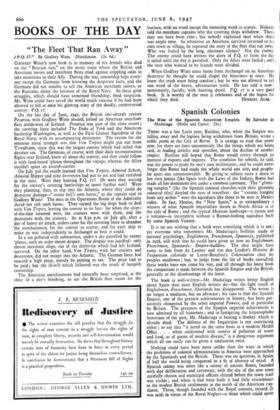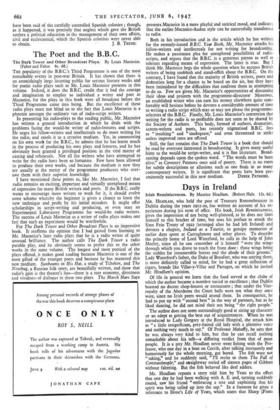Spanish Colonies
THERE was a late Latin poet, Rutilius, who, when the Empire was falling away and the legions being withdrawn from Britain, wrote a
noble poem to the City of Rome. It is strange to read that poem now, for there are lines uncommonly like the things which are being said, in leading articles and speeches, about the decline of another empire. Rutilius still hoped that Rome would revive through an increase of exports and imports. The condition for rebirth, he said, was the power to profit by one's own misfortunes, and he could never forget that Rome had made the whole world one city, and peoples far apart one commonwealth. By giving to subject races a share in her own justice (like Spain with the Laws of the Indies), Rome had made all her dominions live under a common covenant. The "glitter- ing temples." (like the Spanish colonial churches with their gleaming coloured tiles) dazzled the eyes of travellers: the "streams hanging front airy arches" were the aqueducts like those to be seen in Mexico today. In fact, Mexico, the "New Spain," is as extraordinary a witness of what Spanish imperialism meant as North Africa is of the rule of Rome ; and the typical Mexican landscape—a cactus and a volcano—is incomplete without a Roman-looking aqueduct built by some Spanish Viceroy.
It is no use wishing that a book were something which it is not ; yet everyone who remembers Mr. Madariaga's brilliant study in national psychology, Englishmen, Frenchmen, Spaniards, published in 1928, will wish that he could have given us now an Englishmen, Frenchmen, Spaniards: Empire-builders. The idea might have come to him from de Lannoy and van den Linden's Histoire de Pexpansion coloniale or Leroy-Beaulieu's Colonisation chez les peuples modernes ; but, to judge from the list of books consulted, these works have not come his way, and all through his latest book the comparison is made between the Spanish Empire and the British, generally to the disadvantage of the latter.
The book is well-written—Mr. Madariaga writes better English about Spain than most English writers do—but the light touch of Englishmen, Frenchmen, Spaniards has disappeared. The writer is no longer a mediator, but an advocate ; his case is that the Spanish Empire, one of the greatest achievements in history, has been per- sistently cheapened by the other imperial Powers, and in particular by Britain. The greatness of the Spanish imperial achievement is now admitted by all historians • and in fustigating the hispanophobe historians of the past, Mr. Maariaga is beating a donkey which is already dead. The defence of the Inquisition is not convincing either ; to say that "it acted on the same basis as a modern Health Office . . . when confronted with centres of pollution of water and food, or of germs of modem disease," is a dangerous argument which all too easily can be given a totalitarian twist.
Nothing could have been more unlike than the ways in which the problems of colonial administration in America were approached by the Spaniards and the B,ritish. There was no question, in Spain, of half the world being conquered in a fit of absence of mind. A Spanish colony was more like a colony of ancient Rome, founded with due deliberation and ceremony, with the site of the new town carefully chosen and municipal officers elected before the town itself was visible ; and when it had been built it had little resemblance to the modest British settlements in the north of the American con- tinent. These, though founded with the Royal consent, existed at was said) in virtue of the Royal_ Neglect—a thing which could never
have been said of the carefully controlled Spanish colonies ; though, as it happened, it was precisely that neglect which gave the British settlers a political education in the management of their own affairs, civil and ecclesiastical, which the Spanish colonists were never able



































 Previous page
Previous page